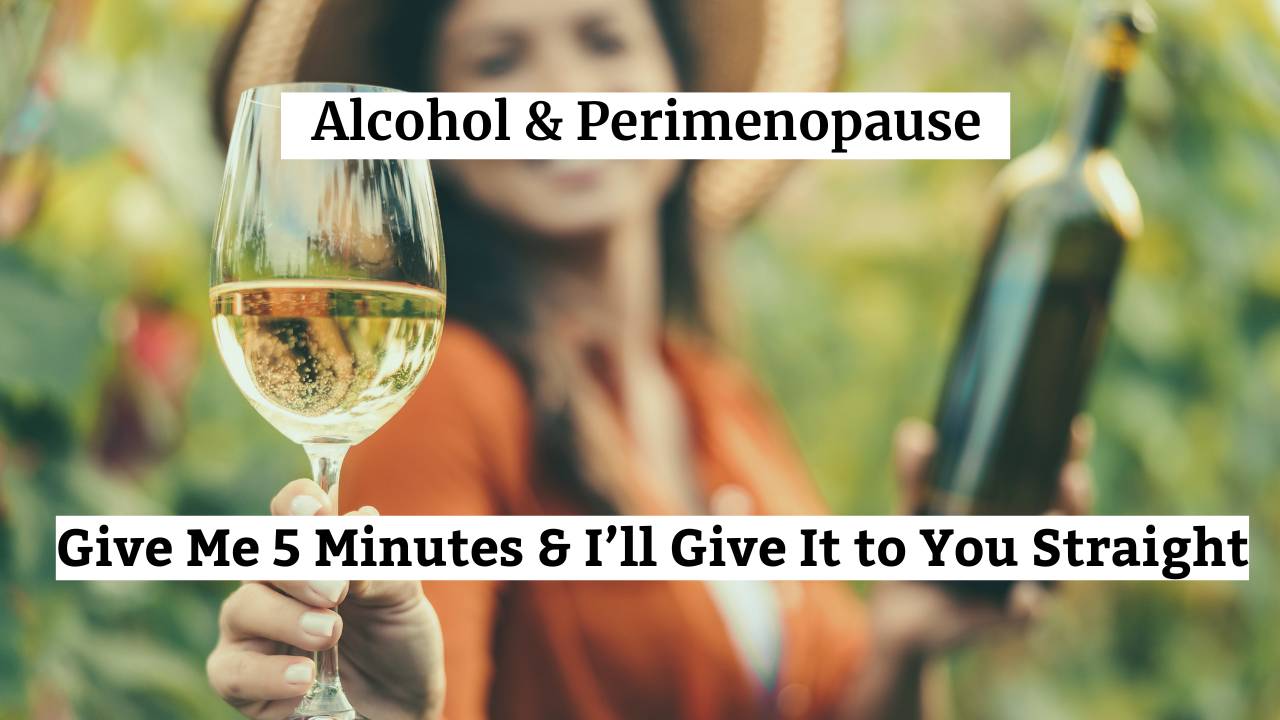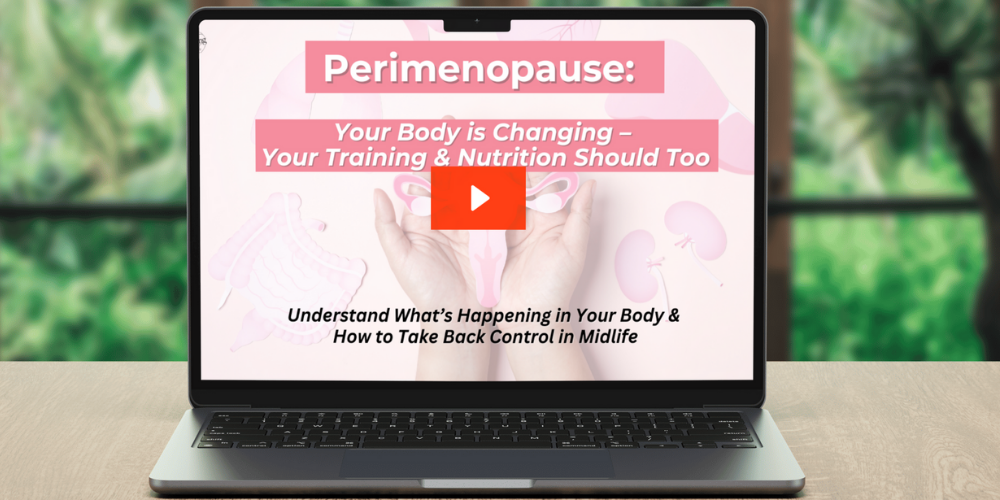Alcohol & Perimenopause: Give Me 5 Minutes & I’ll Give It to You Straight

I know the thought has crossed your mind...
You’ve noticed that alcohol hits differently now
- the restless nights,
- the sudden anxiety spikes,
- the sluggish mornings.
Or maybe you just don’t bounce back like you used to.
Yet, giving it up? That feels like a big step.
Because for years, alcohol has been a reward, a social norm, a way to unwind.
But here’s the thing:
After 40, alcohol is secretly working against you. The friend you once knew has gone and in her place is vindictive B, who is intent on tearing you down.
Drinking alcohol is like tying your left shoe to your right shoelace before going out for a run… you’re never going to be able to hit your stride.
If you’re on the fence about quitting (or even just cutting back), give me five minutes. I’m breaking down exactly how alcohol is messing with your body—from your hormones to your metabolism to your mental health—so you can make a choice that actually supports you.
The Truth About Alcohol & Your Hormones
Let’s start with what’s actually happening in your body when you drink. Because I guarantee—it’s not just a little “fun” anymore. As your hormones shift in midlife, alcohol hits harder and lingers longer.
1. Alcohol Ramps Up Estrogen, Making Symptoms Worse
Alcohol spikes estrogen while suppressing progesterone, your natural calming hormone. These hormone fluctuations going on behind the scenes is what we feel in way of our symptoms...
And in perimenopause? The fluctuations are ramping up and out of control... So, by drining you are putting gasoline on an already out of control fire.
📌 What Happens?
🔸 Alcohol increases estrogen levels, sometimes tripling them.
🔸 Lower progesterone means more mood swings, breast tenderness & bloating.
🔸 Your liver prioritises alcohol metabolism over estrogen clearance, leaving more excess estrogen in your system.
📌 Real-Life Impact:
🔥 Hot flushes intensify & more frequenct
🔥 PMS symptoms worsen
🔥 Mood swings hit harder
You should be calming the fire—but with every drink, you’re adding gasoline instead.
2. Alcohol Hijacks Your Stress Hormones
That glass of wine might feel relaxing, but it’s a trick. Like the house made out of sweet in Hansel and Grettle, it seems great at the time - but the consequences are not so fun.
📌 What Happens?
🔸 Alcohol initially lowers cortisol, making you feel calm.
🔸 Within hours, cortisol rebounds—hard.
🔸 One study found heavy drinkers had a 60% higher morning cortisol spike than moderate drinkers.
🔸 Over time, chronic alcohol use keeps cortisol levels abnormally high, leading to:
✔ Increased anxiety & irritability
✔ Weakened immunity
✔ Feeling more overwhelmed
📌 Real-Life Impact:
- You drink to unwind, but the next day you’re more anxious than before.
- You feel restless in the night, even though alcohol made you sleepy.
- You’re snapping at people over little things.
This is why alcohol and perimenopausal anxiety go hand in hand.
3. Alcohol Slows Metabolism & Fuels Weight Gain
If you’re struggling with midlife weight gain, alcohol is huge. Maintaining muscle mass is one of the keys to not only 'getting through' perimenopuase but quality of life as we age - and alcohol is not only tricking your metabolism to store fat - it works against you when you want to maintain muscle. (If you want to work with your female hormones then book a call to discuss if my 1:1 12-week coaching will help you dial in your lifestyle so you can be stronger through midlife).
📌 What Happens?
🔸 Alcohol can halt fat burning for 5+ hours while your body prioritises breaking it down.
🔸 It spikes blood sugar → Crash → Leads to carb cravings.
🔸 It lowers muscle-building hormones, making it harder to maintain muscle mass.
📌 Real-Life Impact:
🚨 Belly fat becomes harder to shift.
🚨 You’re hungrier the next day.
🚨 You store more fat, especially around the midsection.
Alcohol is nothing but empty calories—it gives you nothing in return. Zero. Nada.
Actually, that’s not true—it might hurt you.
It’s like choosing to walk through a field of prickles (gorse, if you're in NZ) when there’s a clear, smooth path right next to it. Why make things harder on yourself when there’s a better way?
4. Alcohol Wrecks Your Sleep (And Triggers 3 AM Wake-Ups)
Yes, alcohol may help you fall asleep faster—but it wrecks your sleep quality.
It’s like running the dishwasher without detergent or rinse aid—it’ll go through the motions, but your dishes won’t come out truly clean. Same with your sleep—you might sleep, but you won’t wake up refreshed.
📌 What Happens?
🔸 Alcohol lowers melatonin by 15-19%, disrupting your circadian rhythm.
🔸 It causes blood sugar crashes that wake you up at 3 AM.
🔸 It triggers cortisol spikes right when you need to be sleeping.
📌 Real-Life Impact:
😵💫 You wake up at 3 AM, restless & wired.
😵💫 You feel exhausted, groggy & unfocused the next day.
😵💫 Your brain fog is worse, making it harder to concentrate.
If you wake up feeling unrested and groggy, alcohol is likely to blame. Your brain hasn’t had its proper “cleaning” overnight, and now thinking feels like trying to see through a greasy, unwashed dish—everything is foggy, sluggish, and unclear.
The Real-World Symptoms You Can’t Ignore
Perimenopause is a lot—and the symptoms can vary wildly from person to person.
But what we do know? Alcohol can make many of them worse.
Here are a few key symptoms that have been studied—and how alcohol impacts each one. 👇
🚨 Hot Flushes & Night Sweats → Alcohol worsens vasomotor symptoms, making night sweats & hot flushes more frequent & intense.
🚨 Mood Swings & Anxiety → Alcohol disrupts serotonin, making you more irritable, anxious & emotionally reactive the next day.
🚨 Sleep Disruption → Alcohol lowers melatonin, making sleep lighter & more fragmented (hello, 3 AM wake-ups).
🚨 Brain Fog & Fatigue → Alcohol impairs cognitive function, making it harder to focus, remember things, or feel sharp.
🚨 Weight Gain & Sugar Cravings → Alcohol spikes blood sugar & cravings, making weight management way harder.
📌 “So if you feel ‘off’ the morning after drinking—even just one or two drinks—this is why.”
Ok, so you want to Quit... but it's hard - Let's make it Easier
Knowing why it's hard to Quit.
💡 1. Alcohol Triggers Dopamine → That initial rush makes your brain associate it with reward, but the crash afterward makes you crave it more.
💡 2. It’s a Habit, Not Just a Drink → For most of us, drinking isn’t just about alcohol—it’s about the ritual, the ‘reward’ after a long day.
💡 3. Society Normalises It → We’ve been conditioned to think wine is ‘self-care’—when in reality, it’s self-sabotage in disguise.
📌 “Understanding these mental hooks is the first step to breaking free.”
How to Cut Back (Without Feeling Deprived)
✅ 1. Follow the ‘1:1 Rule’ → For every alcoholic drink, have a full glass of water.
✅ 2. Set a Drinking Cutoff → No alcohol 3+ hours before bed to protect sleep & metabolism.
✅ 3. Swap for a Mocktail with Benefits → Tart cherry juice, magnesium-rich drinks, or herbal teas can give you that ‘wind-down’ feel without the negative effects.
✅ 4. Set Boundaries Before a Night Out → Decide ahead of time how many drinks you’ll have (if any), and stick to it.
✅ 5. Choose a ‘Placebo Drink’ → Put a mocktail in a wine glass or sip soda with lime & mint—so you still feel part of the event.
MY FAVOURITE
✅ 6. Go 'dry' for a month → It’s not forever, just 30 days.
Try cutting out alcohol for a month and track the changes—your sleep, energy, mood, and those morning-after regrets (or lack thereof).
Notice how your brain feels sharper, your body feels lighter, and your emotions feel more stable.
I have yet to meet anyone over 40 who isn’t affected by alcohol—give yourself the chance to see just how much better you can feel without it!
Final Thoughts: Is Alcohol Worth It?
🎤 “Alcohol is not your friend in perimenopause—it messes with your hormones, wrecks your sleep & makes weight loss harder.”
🔥Ready to feel better through your hormonal fluctuations but overwhelmed by all the ‘shoulds’?
Check out my 12-week 1:1 coaching package—designed for busy women who feel stuck in a cycle of knowing what to do but not knowing where to start.
Step by step, I’ll guide you through working with your hormones and making real, sustainable changes to your diet, exercise, and lifestyle—so you can feel like yourself again through this transition. Let’s make it simple, doable, and effective. 💛
Tired of Not Knowing What to Eat?
The 1,2,3 Meal Method Takes the Guesswork Out of Healthy Eating!




